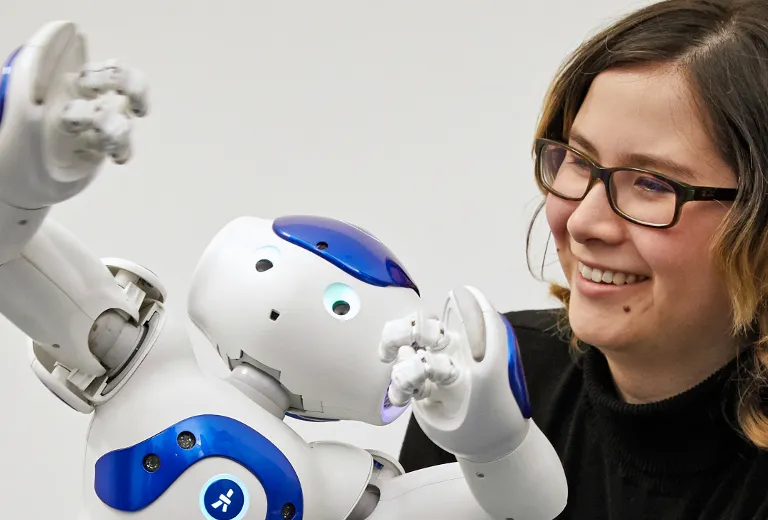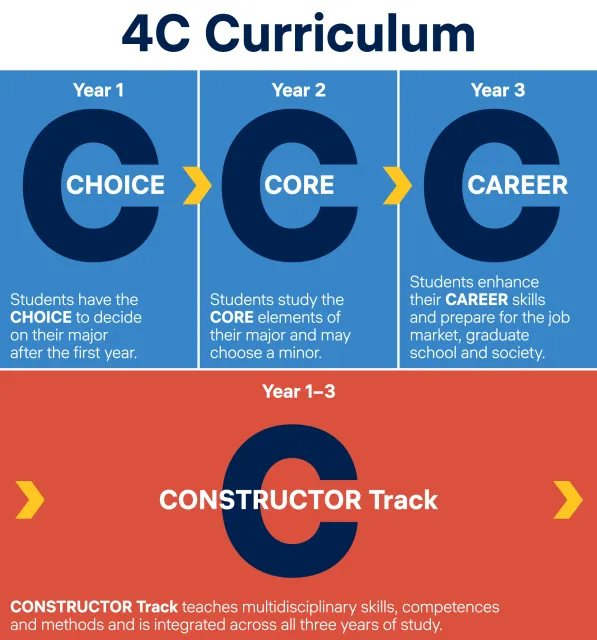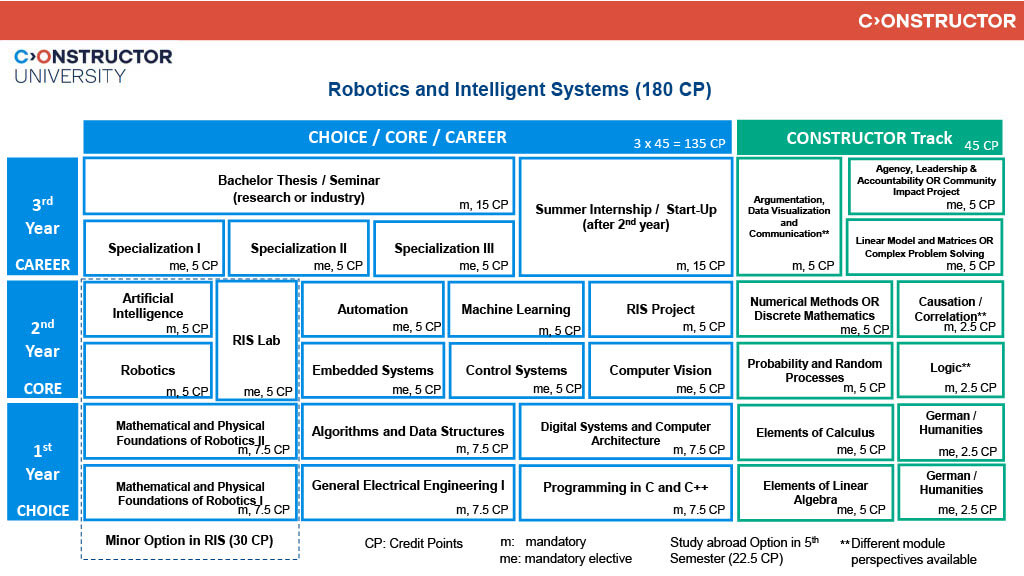

Robotics and Intelligent Systems
Robotics and Intelligent SystemsThis study program belongs to the School of Computer Science & Engineering
Location: On Campus
This program focuses on the engineering methods and technologies essential for developing autonomous mobile systems, such as robots, that can operate independently without constant human supervision. The English-taught program emphasizes the application of these methods and technologies in the fields of robotics and automation, including industries such as automotive and transportation, communication technologies, marine technology, and logistics.
Additionally, the program explores the transdisciplinary aspects of mobility in intelligent natural systems. Students will gain hands-on experience with the latest technical systems and methods through practical work in state-of-the-art laboratory facilities. Overall, this program provides students with a comprehensive education in the development and application of autonomous mobile systems, preparing them for careers in this exciting and rapidly growing field.
The undergraduate program at Constructor University is a three-year, 180-credit-point program designed to prepare students for a wide range of career paths.
The “4C Model” is the program's backbone, with disciplinary content grouped into three themes according to study years: CHOICE-CORE-CAREER. Additionally, the “CONSTRUCTOR Track”, an integral part of the program, runs parallel throughout the program. It provides students with multidisciplinary content and essential skills such as argumentation, data visualization, societal engagement, and communication.
The curriculum allows students to tailor their education to their goals and to explore different fields of study, with the flexibility to change their major within the first year. Moreover, the programs include a mandatory internship and a study-abroad opportunity in the fifth semester to provide students with hands-on experience and a global perspective.

The first study year is characterized by a university-specific offering of disciplinary education that builds on and expands upon the students’ entrance qualifications. Students select introductory modules for a total of 45 CP from the CHOICE area of a variety of study programs, of which 15-45 CP will belong to their intended major.
To pursue Robotics and Intelligent Systems as a major, the following CHOICE modules (45 CP) need to be taken:
- CHOICE Module: Mathematical and Physical Foundations of Robotics I (7.5 CP)
- CHOICE Module: Mathematical and Physical Foundations of Robotics II (7.5 CP)
- CHOICE Module: Programming in C and C++ (7.5 CP)
- CHOICE Module: Algorithms and Data Structures (7.5 CP)
- CHOICE Module: General Electrical Engineering (7.5 CP)
- CHOICE Module: Digital Systems and Computer Architecture (7.5 CP)
Students can still change to another major at the beginning of their second year of studies, provided they have taken the corresponding mandatory CHOICE modules in their first year of studies.
To allow further major changes after the first semester, the students are strongly recommended to register for the CHOICE modules of one of the following study programs:
- Electrical and Computer Engineering (ECE):
- CHOICE Module: General Electrical Engineering I (7.5 CP)
- CHOICE Module: General Electrical Engineering II (7.5 CP)
- CHOICE Module: Classical Physics (7.5 CP)
- CHOICE Module: Digital Systems and Computer Architecture (7.5 CP)
- CHOICE Module: Foundations of Communications and Electronics (7.5 CP)
In the second year of study, students will delve deeper into their chosen major by taking 45 credit points (CP) worth of in-depth, discipline-specific CORE modules. These modules are designed to enhance students' critical understanding of the core theories, principles, and methods of their major, bringing them up to speed with current knowledge and best practices.
To pursue Robotics and Intelligent Systems as a major, 30 CP from the following mandatory (m) and mandatory elective (me) CORE modules need to be taken:
- CORE Module: Robotics (5 CP)
- CORE Module: Artificial Intelligence (5 CP)
- CORE Module: RIS Lab (5 CP)
- CORE Module: Automation (5 CP)
- CORE Module: Embedded Systems (5 CP)
- CORE Module: Control Systems (5 CP)
- CORE Module: Computer Vision (5 CP)
- CORE Module: Machine Learning (m, 5 CP)
- CORE Module: RIS Project (m, 5 CP)
For the remaining 15 CP, students have the option to select modules based on their interests and/or pursue a minor in Computer Science. Alternatively, they may choose to complete all of the mandatory elective CORE modules listed above.
During their third year, students focus on preparing for their post-graduation career by exploring their options and gaining professional experience through a mandatory summer internship.
The fifth semester offers a unique opportunity for students to study abroad and broaden their cultural and academic horizons. In the final semester, students hone their research skills by working on an extended Bachelor's thesis project.
To pursue RIS as a major, at least 10 of the 15 CP from the following major-specific Specialization modules need to be taken:
- RIS Specialization: Human Computer Interaction (5 CP)
- RIS Specialization: Marine Robotics (5 CP)
- RIS Specialization: Optimization (5 CP)
A maximum of 5 CP can be taken from major-related modules instead of major-specific Specialization modules:
Modules from Computer Sciences
- Specialization: Distributed Algorithms (5 CP)
- Specialization: Computer Graphics (5 CP)
- Specialization: Web Application Development (5 CP)
- CORE Module: Software Engineering (7.5 CP)
- CORE Module: Databases (7.5 CP)
Modules from Electrical and Computer Engineering
- Specialization: Digital Design (5 CP)
- CORE Module: PCB design and measurement automation (5 CP)
- CORE Module: Information Theory (5 CP)
Modules from Mathematics
- Specialization: Stochastic Processes (5 CP)
- Specialization: Stochastic Methods Lab (7.5 CP)
Modules from Industrial Engineering and Management
- CORE Module: Operations Research (5 CP)
Modules from Data Engineering (MSc)
- ELECTIVE: Parallel and Distributed Computing (5 CP)
At Constructor University, students are provided with a unique opportunity to boost their employability through a mandatory two-month internship worth 15 credits. This opportunity usually takes place during the summer between the second and third year of study, providing students with the chance to gain practical experience in a professional setting. Through this internship, students can apply the knowledge and understanding they have gained from their major to real-world contexts, evaluate the significance of their major in the employment sector and society, reflect on their personal role in employment and society, and make informed career decisions. For students interested in starting their own company, an alternative to the full-time internship is offered in the form of a start-up option, which allows them to focus on developing their business plan.
The CONSTRUCTOR Track is another important feature of Constructor University’s educational model. The Constructor Track runs orthogonal to the disciplinary CHOICE, CORE, and CAREER modules across all study years and is an integral part of all undergraduate study programs. It provides an intellectual tool kit for lifelong learning and encourages the use of diverse methodologies to approach cross-disciplinary problems. The CONSTRUCTOR track contains Methods, New Skills and German Language and Humanities modules.
Methods
Methods and skills such as mathematics, statistics, programming, data handling, presentation skills, academic writing, and scientific and experimental skills are offered to all students as part of the Methods area in their curriculum. The modules that are specifically assigned to each study programs equip students with transferable academic skills. They convey and practice specific methods that are indispensable for each students’ chosen study program. Students are required to take 20 CP in the Methods area. The size of all Methods modules is 5 CP.
To pursue Robotics and Intelligent Systems as a major, the following Methods modules (20 CP) need to be taken as mandatory modules:
- Methods Module: Calculus and Elements of Linear Algebra I (m, 5 CP)
- Methods Module: Calculus and Elements of Linear Algebra II (m, 5 CP)
- Methods Module: Probability and Random Processes (m, 5 CP)
Students who have a strong mathematical background can also choose Matrix Algebra & Advanced Calculus I and II (me, 5 CP each) instead of Calculus and Elements of Linear Algebra I and II.
Furthermore, students can choose between the Methods module
- Methods Module: Numerical Methods (me, 5 CP)
and the Mathematics CORE module:
- CORE Module: Discrete Mathematics (me, 5 CP)
New Skills Modules
This part of the curriculum constitutes an intellectual and conceptual tool kit that cultivates the capacity for a particular set of intellectual dispositions including curiosity, imagination, critical thought, and transferability. It nurtures a range of individual and societal capacities, such as self-reflection, argumentation and communication. Finally, it introduces students to the normative aspects of inquiry and research, including the norms governing sourcing, sharing, withholding materials and research results as well as others governing the responsibilities of expertise as well as the professional point of view. Students in this study program are required to take the following modules in their second and third year:
- New Skills Module: Logic (m, 2.5 CP)
- New Skills Module: Causation and Correlation (m, 2.5 CP)
- New Skills Module: Argumentation, Data Visualization and Communication (m, 5 CP)
Furthermore, they must choose either
- New Skills Module: Linear Model/Matrices (me, 5 CP) or
- New Skills Module: Complex Problem Solving (me, 5 CP)
as well one of the following modules:
- New Skills Module: Agency, Leadership and Accountability (me, 5 CP) or
- New Skills Module: Community Impact Project (me, 5 CP).
German Language and Humanities Modules
German language abilities foster students’ intercultural awareness and enhance their employability in their host country. They are also beneficial for securing mandatory internships (between the 2nd and 3rd year) in German companies and academic institutions. Constructor University supports its students in acquiring basic as well as advanced German skills in the first year of the Constructor Track. Non-native speakers of German are encouraged to take 2 German modules (2.5 CP each), but are not obliged to do so. Native speakers and other students not taking advantage of this offering take alternative modules in Humanities in each of the first two semesters.
The curriculum of the study program is outlined in the schematic study plan:

All study programs at Constructor University are accredited by the German Accreditation Council, guaranteeing adherence to high academic quality and international standards. This accreditation confirms that each program meets formal and subject-related criteria in terms of content, structure, and intended learning outcomes.
Join Constructor University in 5 easy steps:
- Complete your application
- Receive your decision after 3-4 weeks
- Learn about financing options
- Enroll and pay your deposit
- Settle in during O-Week and start your studies


Discover all the information you need about our fees and financing options for Constructor students. Our dedicated Student Financial Service Team will assist you in finding the best financial solution that will enable you to pursue your desired program and create a successful career path.
Cost of attendance 2025 / 2026
The direct costs of attendance include tuition, room and board, and fees, as outlined below.
Career options include areas such as research and development or management tracks in automotive and transport, robotics and automation, communication technologies, marine technology and logistics industries. Given the increasing need for automation of daily life tasks through intelligent mobile systems, there is a significant number of career options in addition to the core ones that are covered in the program.
The robotics and intelligent systems program matches scientific content with real-world use cases. This is a strength of the Constructor offer, to introduce students to real-world applications.
Field trips and participation in robotics competitions significantly contribute to bringing students closer to the market and to real challenges, in addition to being an excellent opportunity for professional networking.
Companies who hired recent graduates of the IMS program (Intelligent Mobile Systems, the former name of RIS) include Cambio CarSharing Deutschland, Daimler AG, Klöckner Desma GmbH, Objective Software GmbH, Ubimax.
Several graduate programs have offered a position to IMS students, including the Master in Artificial Intelligence, offered by Universita’ della Svizzera Italiana (Switzerland), the Erasmus Mundus Joint Master Degree on Advanced Robotics, offered by Centrale Nantes (France), University of Genoa (Italy), Warsaw University of Technology (Poland), and Jaume I University (Spain), the Master in Robotics, offered by Heriot-Watt University (Scotland, UK).

This study program is part of the School of Computer Science & Engineering.
The School of Computer Science and Engineering focuses on research and development in information, communication, and production technologies, intelligent and autonomous systems, as well as the flow of goods.
Key disciplines in the school include Mathematics, Computer Science, Robotics, and Electrical Engineering.


Become part of a global community
Constructor University Students come from all over the world to live and learn at Constructor University. Our student body represents 120 nations. They form an ambitious campus community whose internationality is unprecedented in Europe. Constructor University’s green and tree-shaded 80-acre campus provides much more than buildings for teaching and research.

Call us or write us – we are happy to help you with your inquiry.
Phone: 0421 200 4200
Email: study@constructor.university


